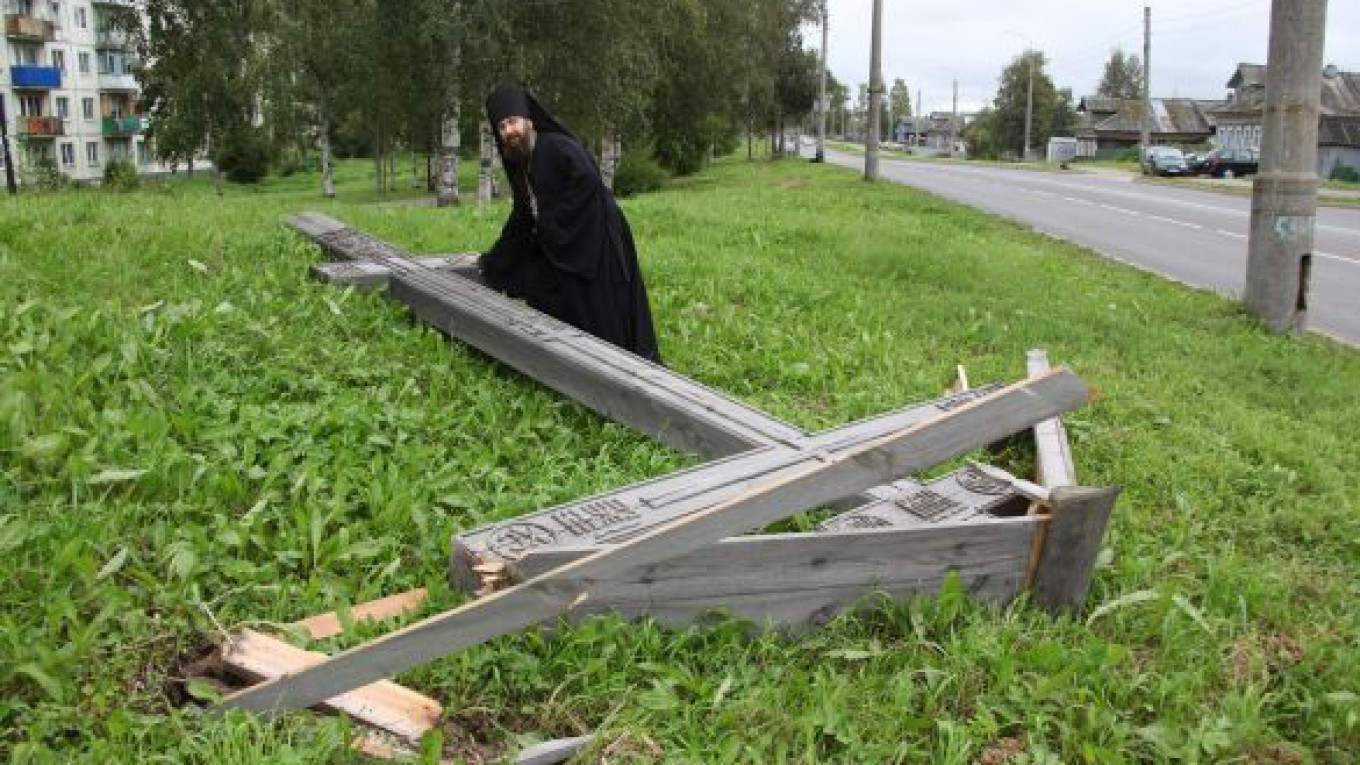The Russian Orthodox Church is calling for the punishment of vandals who used chainsaws to topple at least four wooden crosses in two regions over the weekend, prompting widespread outrage that some fear might lead to religious unrest.
Unknown vandals cut down three wooden crosses in the Chelyabinsk region and one in the Arkhangelsk region. The motive was unclear, but the actions occurred two weeks after Ukrainian feminists sawed down a memorial cross in Kiev to denounce the harsh two-year prison sentences handed down to Pussy Riot musicians for singing an anti-Putin song in Moscow's Christ the Savior Cathedral.
Anna Shevchenko, a member of Femen, the Ukrainian feminist group behind the Kiev incident, endorsed the chainsaw attacks in Russia and called for them to continue. But Shevchenko, speaking during an interview with Ekho Moskvy radio on Sunday, did not claim responsibility on behalf of Femen for carrying them out.
Father Vsevolod Chaplin, who oversees relations between the Russian Orthodox Church and the state, called for the police to find those responsible and punish them.
"These actions speak clearly about the moral values of those who are encroaching on the church," Chaplin told Interfax. "By these symbolic actions, they are trying to impose their will over the majority of the people."
Police in both regions said they were looking into the incidents as acts of vandalism. No criminal cases had been opened as of late Sunday afternoon. Vandalism charges can carry up to three years in prison.
The church has found an unlikely ally in Pyotr Verzilov, the husband of Nadezhda Tolokonnikova, one of the three jailed members of Pussy Riot. He condemned the vandalism and said the female punk group had nothing to do with it.
The church's image has been tarnished by a series of leadership scandals, including the Pussy Riot trial, which cast the spotlight on the close ties between the church and state; Patriarch Kirill's ownership of an expensive Swiss Breguet watch and luxury residences; and a recent car crash involving a priest. But the sawing down of crosses is seen by some observers as an attack on ordinary believers.
"There is something meaningful in the fact that the destructive power has turned, not on gold-plated houses or Mercedes cars believed to be driven by priests … but on the simple, wooden cross — a very original, very central, very undoubted Christian symbol. Is it because this symbol is the most defenseless?" Andrei Zolotov Jr., a RIA-Novosti journalist who closely follows the Orthodox church, wrote on his Facebook page.
The top clergyman in the Moscow region village of Vnukovo, Father Vasily, described the cross attacks as "incivility in the worst sense of the word."
"All of our churchgoers are educated people, and while they look at the Pussy Riot action with a bit of humor, they are observing these actions against the crosses with a deep sense of sadness," Father Vasily said by telephone Sunday.
A priest in the city of Ryazan was more circumspect. "We? are the ones who are provoking this situation," he said, speaking on condition of anonymity to avoid being reprimanded by his superiors. "People dislike the authorities, and in their eyes the church is an organization that is closely connected? to the state. Even the muscle that we flex is state muscle."
Human rights ombudsman Vladimir Lukin criticized the vandals as "cowards" and demanded that they offer a public explanation of their actions.
He said the vandals should borrow a page from Narodnaya Volya, or the People's Will, a leftist terrorist group in the 19th century that assassinated Tsar Alexander II. "They often stayed at the crime scene because they saw their outrageous crimes in the context of their ideas and they were ready to take responsibility for them," Lukin said in an interview with Russian News Service radio.
Related articles:
A Message from The Moscow Times:
Dear readers,
We are facing unprecedented challenges. Russia's Prosecutor General's Office has designated The Moscow Times as an "undesirable" organization, criminalizing our work and putting our staff at risk of prosecution. This follows our earlier unjust labeling as a "foreign agent."
These actions are direct attempts to silence independent journalism in Russia. The authorities claim our work "discredits the decisions of the Russian leadership." We see things differently: we strive to provide accurate, unbiased reporting on Russia.
We, the journalists of The Moscow Times, refuse to be silenced. But to continue our work, we need your help.
Your support, no matter how small, makes a world of difference. If you can, please support us monthly starting from just $2. It's quick to set up, and every contribution makes a significant impact.
By supporting The Moscow Times, you're defending open, independent journalism in the face of repression. Thank you for standing with us.
Remind me later.


